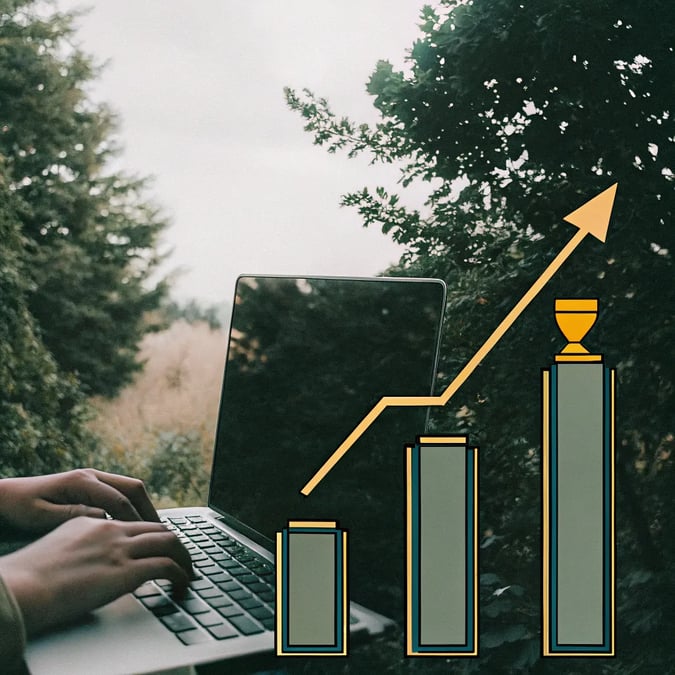
The first time I transferred money into my brokerage account last January, my finger hovered over the "buy" button for nearly ten minutes. Despite months of research, that initial $2,000 investment felt monumental—like jumping off a cliff with only books and YouTube videos as my parachute. Looking back on my first year investing in index funds, I've learned more from experience than any finance article could have taught me.
The Decision to Start With Index Funds
Like many new investors, I spent weeks debating where to put my hard-earned savings. Individual stocks seemed exciting but intimidating. Crypto had friends boasting about gains, but the volatility made me queasy. Eventually, I kept returning to the same advice from trusted sources: index funds offer diversification, lower fees, and historically reliable returns.
The simplicity was appealing. Instead of trying to pick winning stocks, index funds let me own tiny pieces of hundreds or thousands of companies at once. For someone with a full-time job and limited interest in analyzing quarterly earnings reports, this passive approach made sense.
My Initial Investment Strategy

I started with a three-fund portfolio approach:
- 70% in a total US stock market index fund
- 20% in an international stock index fund
- 10% in a total bond market fund
This allocation wasn't particularly creative, but it gave me broad market exposure while I learned the ropes. My plan was to contribute $500 monthly regardless of market conditions—a strategy called dollar-cost averaging.
Early Wins That Built Confidence
Staying Calm During Market Dips
Last March, when the market dropped nearly 6% in a week, I noticed something surprising—I didn't panic. Having read countless stories about market volatility, I was mentally prepared. Instead of selling, I actually increased my monthly contribution to $700 that month, buying more shares at lower prices.
This turned out to be my first real win. By July, those March purchases had appreciated significantly, teaching me the practical value of "buying the dip" rather than just understanding it conceptually.

Automating My Investments
The best decision I made was setting up automatic transfers to my investment account. Every payday, money moved directly from checking to investments before I could spend it elsewhere. This simple automation turned investing from a monthly decision into a background habit.
As behavioral finance experts often point out, removing the need for constant decision-making eliminates many psychological barriers to consistent investing. By December, I'd invested $7,200 without feeling the pinch in my monthly budget.
Mistakes I Made Along the Way
Checking My Portfolio Too Frequently
Despite planning to be a long-term investor, I initially checked my portfolio daily—sometimes multiple times. This constant monitoring amplified normal market fluctuations into emotional rollercoasters. A 2% drop (completely normal in markets) would affect my mood all day.

As one Reddit user in r/investing put it: "Checking your long-term investments daily is like digging up seeds you planted to see if they're growing." Eventually, I limited myself to monthly check-ins, which dramatically improved both my investing experience and mental health.
Chasing Performance Mid-Year
My biggest mistake came in August when I abandoned my original plan after reading about the outperformance of growth stocks. I shifted about 30% of my portfolio from my total market fund to a growth-focused ETF.
This move taught me two expensive lessons:
- Timing the market rarely works for beginners
- Strategy changes often incur unnecessary taxes and fees
By October, growth stocks had underperformed the broader market, and I'd paid transaction costs and realized capital gains for the privilege of lower returns. I eventually returned to my original allocation, but not before learning that boring consistency often beats exciting changes.
What Would I Have Done Differently?
Started With a Target Date Fund
If I could restart my investing journey, I would have begun with a single target date fund for the first six months. These all-in-one funds automatically maintain diversification and rebalance as needed, allowing new investors to focus on building the habit of investing before worrying about allocation details.
As Charles Schwab notes in their article about portfolio withdrawals, even experienced investors benefit from simplicity in their strategies. For beginners, this simplicity is even more valuable.
Set Clear Investment Goals First
I started investing because I knew I should, but without specific goals. Was I saving for retirement? A house down payment? Without clarity, I lacked context for evaluating my progress.
Midway through the year, I finally created concrete goals with timelines:
- Long-term retirement (25+ years): 80% of investments
- House down payment (5-7 years): 20% of investments
This clarity helped me select appropriate investments for each goal and reduced my anxiety about short-term performance for my retirement funds.
How Did My Returns Compare to Expectations?
For the year, my portfolio returned approximately 12.3%—slightly below the S&P 500's performance but respectable for a diversified portfolio. However, I realized that in the first year, my saving rate mattered far more than my investment returns.
The math makes this clear: On my $7,200 invested, even an exceptional 20% return would only yield $1,440. Meanwhile, increasing my monthly contribution by just $200 would add $2,400 to my portfolio regardless of market performance.
This perspective helped me focus less on squeezing out additional percentage points of return and more on increasing my contribution rate—a factor entirely within my control.
Should You Use a Financial Advisor When Starting Out?
One question I debated was whether to hire a financial advisor. After researching options, including firms like Fisher Investments that some Reddit users have discussed, I decided against it for my situation.
With a relatively small portfolio and straightforward needs, the 1-1.5% management fee common among advisors would have significantly impacted my returns. As noted in White Coat Investor's article on financial errors, investment costs compound dramatically over time—the difference between a 0.1% expense ratio on an index fund and a 1.5% advisory fee represents substantial money over decades.
However, I can see value in consulting an advisor for:
- Complex tax situations
- Estate planning needs
- Behavioral coaching during market downturns
- Specialized financial circumstances
For now, continuing my education through books and reputable online resources seems sufficient.
Looking Ahead to Year Two
As I enter my second year of investing, my plan focuses on three areas:
- Increasing contributions: Aiming to invest 20% of my income, up from about 15% last year
- Further simplification: Consolidating from three funds to two to reduce complexity
- Less tinkering: Committing to quarterly rather than monthly portfolio reviews
The biggest lesson from year one was that successful investing isn't about finding perfect investments—it's about consistently following a reasonable plan while avoiding major mistakes.
Common Questions About First-Year Index Fund Investing
How much money do I need to start investing in index funds?
Many brokerages now offer index funds with no minimum investments or the ability to purchase fractional shares. I started with $2,000, but you could begin with as little as $100 at most major brokerages. The key is starting early rather than waiting until you have a "significant" amount.
Some index funds from providers like Vanguard traditionally had $3,000 minimums, but most brokerages now offer ETF versions of these same funds that can be purchased for the price of a single share or even less with fractional investing.
Disclaimer: This article is for informational purposes only and does not constitute financial advice. The experiences shared are personal and may not reflect optimal investment strategies for your specific situation. Always consult with a qualified financial professional before making investment decisions.
Tags

About Graham Elwood the Author
Graham Elwood is a seasoned finance journalist with a keen eye for uncovering the most inspirational success stories in the financial sector, particularly those involving groundbreaking startups and visionary entrepreneurs.
Recommended Articles
Mechanics Recommend These 6 Cars That Rarely Need Repairs
Discover the top 6 recommended cars that rarely need repairs, ensuring reliability and peace of mind for every driver.
Ease Morning Stiffness With This 60-Second Movement Trick
Ease morning stiffness with a simple 60-second movement trick to improve flexibility and start your day right. Perfect for all ages.
8 Gadgets From the 90s and 2000s Worth a Fortune Today
Explore 8 nostalgic gadgets from the 90s and 2000s that are now surprisingly valuable collectibles worth digging out of your attic.
First Look at the 2026 Hyundai H1 Family Van
Explore the innovative 2026 Hyundai H1 Family Van, offering spacious design, advanced technology, and a commitment to sustainability for modern families.
2026 Nissan Navara: Rugged Power Meets New Tech
Discover the 2026 Nissan Navara, blending rugged off-road capability with advanced technology and modern design for versatile performance.




